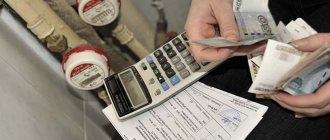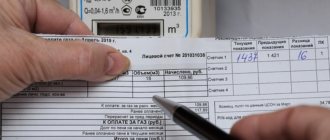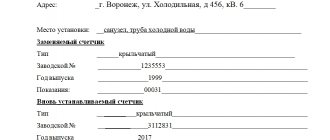The practice of renting housing in our country is widespread. If all rights and responsibilities are not outlined in advance, various types of conflicts may arise during your stay.
When the owner pays for utilities, housing and communal services include:
1. Water supply. 2. Water disposal. 3. Electricity. 4. Gas supply. 5. Garbage and solid waste removal. 6. Payment for common house meters. 7. Elevator maintenance. 8. Heat supply.
The supplier company is responsible for the quality of services. Most of the company draws up service agreements directly with residents of apartment buildings or with the management company.
Companies sell their services, so the consumer must make monthly payments to continue using the resources. The calculation is carried out in accordance with current legislation. Payment is made based on the standard or based on meter readings. The consumption rate and cost per unit of consumption are set at the discretion of local authorities.
Not only the cost of a specific resource is paid, but also the maintenance of utility networks and compliance with high quality delivery.
What does it mean if utility bills are included without meters?
Companies sell their services, so the consumer must make monthly payments to continue using the resources.
The calculation is carried out in accordance with current legislation. Payment is made based on the standard or based on meter readings. The consumption rate and cost per unit of consumption are set at the discretion of local authorities. Thus, we can say that some items in the receipt for housing and communal services will have a stable tariff, and some depend on the monthly consumption of the apartment residents. Therefore, in many respects it is fair if tenants begin to pay only variable expenses, because the tax on renting out an apartment falls on the shoulders of the apartment owner.
Utilities included what does that mean?
There is another option when the tenant compensates the owner of the apartment for utility costs in a separate payment. In this option, the lease agreement specifies two parts: a fixed amount for renting an apartment and a variable payment for utilities for the past month.
Starting from 2021, the Russian government is limiting the growth of total payments for utility services by introducing maximum increase indices, which, in turn, must be adjusted by governors in each region. In practice, this does not save ordinary consumers from additional costs for housing and communal services. From 1.01. until 06/30/2021.
What does it mean that utilities are included except for meters?
The Government of the Russian Federation has established a procedure for changing the amount of payment for the maintenance and repair of residential premises in the case of the provision of services and performance of work on the management, maintenance and repair of common property in a house of inadequate quality and (or) with interruptions exceeding the established duration (PP-307, PP-491)
It is better to agree on such issues when signing the contract and write down all the points. But personally, I think so. Tenants must pay for what would not be spent if the apartment was empty. After all, the homeowner pays for major repairs, maintenance and other items in any case. After all, if no one is registered in the apartment, then the payment still comes early, there is some kind of benefit for 30 rubles (probably this is garbage collection). And for electricity, gas, water, possibly telephone and Internet, those who use the services must already pay directly. After all, it is unknown how long they will live in the apartment, why should they pay for major repairs.
What does it mean when renting a home?
When renting a home, a person expects some minimum of household amenities - water, electricity, gas, heating. If the house is multi-story, the apartment being rented is not on the first or second floor, a properly working elevator is important.
The cost depends on the delivery conditions:
- The living space is rented with or without furniture;
- renovations in the apartment: if the premises need to be “hands-on”, then the rent should be significantly reduced (by agreement with the owners, the cost of the materials used can be taken into account as the payment for housing);
- the condition of the necessary plumbing, household appliances (stoves, for example).
Surrounding factors influence the amount of payment for renting real estate:
- Proximity to the metro station.
- Availability of public transport stops (if necessary).
- Surrounding infrastructure - are there shops nearby, especially grocery stores, access roads to the house, sidewalks, a playground and much more.
- Cleanliness in the entrance if the building is multi-apartment.
- Good neighbors - no one wants to live next to alcoholics or a shelter apartment for a huge number of stray animals.
The size of the accommodation fee plays a decisive role.
Comm payments are included without meters, what does this mean?
All housing and communal services can be divided into two large groups: Utilities, which are calculated and paid by owners or tenants of housing based on actual volumes of consumption or established standards: - suppliers are required to provide a round-the-clock supply of household gas, which can be used both for cooking and in order to; — a prerequisite for the supply of electricity is compliance with the necessary standards (mains voltage, safety, etc.)
- Lighting of common areas and surrounding areas.
- Cleaning and landscaping the local area - lawns and flower beds appear in the yard for a reason; this is included in the list of mandatory expenses for homeowners and tenants.
- Costs for maintaining the elevator - the management company is obliged to provide residents with such a service around the clock and without interruption.
- Current and major home repairs.
- Maintenance of common property.
- Removal of household waste.
Interesting read: What documents are needed when selling a car?
New in payment for housing and communal services
From 2021, all types of payments for housing and communal services will be classified into two large groups: individual and general. This distribution will be reflected in the receipt of each owner. The first part of the payment will display charges for:
- water;
- warm;
- electricity.
The consumption of these resources is considered individual, and therefore is displayed separately from general household ones, which include:
- entrance heating;
- elevator repair and maintenance;
- major repairs;
- other.
When calculating such payments, the area of the apartment will be taken into account. For some areas of housing and communal services, the number of people registered or temporarily residing on the premises is taken as a basis.
The new normative act also addresses issues of punishment of debtors. Previously, sanctions were applied only to “hard-core” defaulters who did not pay utility bills at all. According to the new rules, the reason for cutting off the supply of resources is a debt for six months (calculation of average debts).
The social package will enable some citizens to defer debt repayment after providing the necessary documents. Using this opportunity, the payer will be able to divide the amount of debt into 12 equal parts. However, the debtor will have to significantly overpay, because the amount of the remaining debt will be subject to a refinancing rate, which is currently 3%.
What does it mean when all utilities are included except meters in 2021
It is better to agree on such issues when signing the contract and write down all the points. But personally I think so
.
Tenants must pay for what would not be spent if the apartment was empty
.
After all, the homeowner pays for major repairs, maintenance and other items in any case
.
After all, if no one is registered in the apartment, then the payment still comes early, there is some kind of benefit for 30 rubles (probably this is garbage collection)
.
And for electricity, gas, water, possibly telephone and Internet, those who use the services must already pay directly
. After all, it is unknown how long they will live in the apartment, why should they pay for major repairs.
Answer: In accordance with paragraph 33 of the Rules for the provision of utility services to owners and users of premises in apartment buildings and residential buildings, approved by Decree of the Government of the Russian Federation No. 354 dated 05/06/2021, the consumer has the right, if he has an individual meter, to take its readings on a monthly basis and transfer the received readings to the contractor or a person authorized by him no later than the date established by the agreement containing provisions for the provision of utility services.
Save on heating
Experts say that installing heat metering devices reduces monthly costs by 1/3. However, not every apartment building can achieve such results.
If the payer lives in a house that was put into operation over the last 10-15 years, then he actually pays less than the standard. That is, without a counter. Such buildings are constructed taking into account resource-saving requirements and are well insulated.
However, if public utilities “plug” such a device into a building built in the 60-90s of the last century, then people’s heating costs can only increase.
The procedure for determining the amount of payment for utilities, approved by the Decree of the Government of the Russian Federation of May 6, 2011. No. 354.
The amount of payment for heating in an apartment building equipped with a common building meter is determined evenly throughout the calendar year based on the average monthly volume of thermal energy consumption for the previous year, the tariff and the total area of the apartment.
That is, heat suppliers charge residents 1/12 of the cost each month, based on the average value calculated from the meter readings for the previous year.
Then the supplier adjusts the payment taking into account the heat supplied in the last winter. And if the winter was cold, then people will receive bills requiring them to pay an additional 5 to 30 thousand rubles (depending on the area and the amount of thermal energy used to heat the “street”).
And since recent winters in central Russia have been frosty, and the wind is blowing in most apartment buildings, in the spring and summer citizens receive payments for heat with additional charges. Cases have already been recorded when residents broke or tore down communal heat meters. However, utility companies persistently install them again and again.
Some even suggest that apartment owners take out loans and insulate their houses themselves. But it's not funny anymore. Insulation of an apartment building will cost 600-700 thousand rubles. And people should not have to pay out of their own pockets for such “energy efficiency” improvements.
Conclusion: the installation of communal heat meters in apartment buildings built in the last century and not reconstructed to reduce heat loss leads to an increase in heating costs by 20-30 percent. This means that in this case it is necessary to seek reconstruction of the building.
What does it mean when all utilities are included except meters
In the future, the landlord can include these costs in the list of expenses that reduce the amount of income tax, that is, in the future he will be able to send an application to the tax service with a request to deduct VAT on the amount that was paid for utilities.
If not the entire apartment is provided for rent, but only some of its rooms, then in this case the current option would be to draw up an agreement in which payment for utilities will be made by both the tenant and the owner of the property, but at the same time they will need to agree on who will pay the bills and for what. The most optimal solution in this case would be to use individual metering devices.
How is housing rent charged?
The amount of payment and rental period are discussed with the landlord during a preliminary viewing of the rental property. It would be good if an agreement was concluded reflecting mutual agreements. Registration will take a little time, but will protect both parties to the contract, allowing you to avoid mutual claims. It is correct if the owner temporarily registers the residents at their place of residence; It’s worth writing a statement to the management company about new tenants.
What does it mean - utility bills are included, except meters
The phrase “utility payments, except for meters” usually means that the owner of the residential premises pays for everything that is listed in the receipt for housing and communal services, except for services for which there are meters. Payment according to meter readings in this case is entirely the responsibility of the tenant.
If there is a concluded agreement, it is easy to prove who is responsible for paying for the use of utility resources. Paragraph 2 of Article 616 of the Civil Code indicates the tenant’s obligation to bear the costs of maintaining the property, and the comments to it indicate that this article allows the tenant and the lessor to distribute maintenance costs.
Flat rent
The law has already been passed! At least discuss it! Obliged and that's it! They include one more item in the general receipt; I don’t understand how people are going to not pay specifically for this item. If you receive a receipt for 5000 rubles, 1000 rubles of which are under the heading of major repairs, will you only pay 4000 or something?
I rent an apartment, and the tenants pay rent and water + electricity + sewerage, gas, and heating and others are on the owner, since these payments are borne by the owner of the apartment in any case whether his apartment is rented or not. If there are no tenants, I pay for heating anyway. I think it's fair that people only pay variable expenses. After all, the apartment tax is not presented to the tenant.
Utility payments include payment for
Owners of residential buildings bear the costs of their maintenance and repair, and also pay for utilities in accordance with agreements concluded with persons engaged in the relevant types of activities.4. Utility fees include fees for cold and hot water supply, sewerage, electricity supply, gas supply (including the supply of domestic gas in cylinders), heating (heat supply, including the supply of solid fuel in the presence of stove heating). For more details, see also the Resolution Government of the Russian Federation No. 307 dated May 23, 2021 “On the procedure for providing utility services to citizens”, as well as Decree of the Government of the Russian Federation dated August 13, 2021 No. 491 “On approval of the rules for the maintenance of common property in an apartment building and the rules for changing the amount of fees for the maintenance and repair of residential premises in in the event of the provision of services and performance of work on the management, maintenance and repair of common property in an apartment building of inadequate quality and (or) with interruptions exceeding the established duration”, if necessary, I will send the specified documents by e-mail
Interesting to read: State duty for replacing a license with a change of surname
In particular, the amount of this payment is regulated in accordance with the current ones. A tariff is usually called the cost of a certain volume of utility resources that are supplied to a home. Their sizes are established by the relevant municipal service or by the regional committee, which directly calculates the cost of utilities. It is worth noting that this service also regulates the standards in accordance with which the consumption of resources by each person is carried out.
Payment of utility bills
There are housing and utility services.
Housing services
They appear to maintain the good condition of the property; These include fees for housing maintenance, contributions for major repairs, and removal of solid waste. Typically, the burden of housing costs falls on the landlord.
Public utilities
They imply the availability of benefits for consumers: water supply, sewerage, gas, electricity, heating. If heating is usually not dependent on tenants, then the amount of consumption, and, therefore, the payment for them for other services very much depends on their household habits.
The question of paying for utilities must necessarily be raised during the conclusion of the contract; You need to clarify whether the rent includes payment for utilities. And here’s why: if the landlord does not notify his management company about the discrepancy in the number of residents, and then the fact of such residence is established, then from the 1st day of the month of establishing the fact, utility bills can be recalculated, but the law imposes an obligation to pay for utilities to the actual consumer.
No one is registered at the address, but an expense has appeared - searching for an answer may force the management company to check the residents, and tax inspectors may become interested in the activities of the landlord.
What is included in the cost of utilities
If not the entire apartment is provided for rent, but only some of its rooms, then in this case the current option would be to draw up an agreement in which payment for utilities will be made by both the tenant and the owner of the property, but at the same time they will need to agree on who will pay the bills and for what. The most optimal solution in this case would be to use individual metering devices. What does it mean when all utility bills are fully included, except for meters? The fee for the use of the premises does not include the cost of using utilities, unless any other rules are agreed upon during the process of drawing up the lease agreement.
Receipt structure Modern payment documents have a specific structure fixed at the legislative level, which necessarily includes: The bar code represents the identifier of the payment and the payer, it is necessary for making payments through automatic cash registers, terminals, ATMs The information section includes notifications and messages for service payers (for example, cost increases or preventive shutdowns of services) Information on payments for the previous billing period and meter readings Current tariffs, accrual of benefits or subsidies Volume of consumption for the reporting and previous period and place to enter current meter readings Current consumption standards for residential premises, in which consumption metering devices are not installed Penalty if there is a delay of more than 30 days, etc.
Save on water
As for individual water meters, there are also nuances here. Water supply and sewerage account for up to 30 percent of utility bills. And in the absence of meters, water consumption is determined by the formula: standard * number of people registered in the living space * tariff.
The standard includes not only the average human needs, but also possible water losses, for example, during bathing, washing, washing dishes and brushing teeth. It turns out that only one person consumes about 6.9 cubic meters of water per month.
This is a decent figure, and it is not profitable to pay at such a standard when several people are registered in the apartment. And if you install a meter, you can reduce wastewater costs by 15 percent. But every coin has a downside.
If two people are registered in a dwelling, but in reality there are 5 or 6 people (for example, a young family lives with their parents), then the water consumption meter becomes unprofitable. Therefore, before thoughtlessly installing water meters, think about whether you need it or not.
If the apartment already has a water flow meter, then you should install an economical toilet flush button, lever faucets, eliminate faucet leakage (replace worn gaskets or faucet axle boxes) and simply save water. There is nothing new to come up with here.
Law Club Conference
The procedure for calculating the cost of consumed utility services (depending on the presence (absence) of general and/or individual meters for metering the consumption of utility resources) is regulated by the Rules for the provision of utility services to citizens, approved by Decree of the Government of the Russian Federation dated May 23, 2021 No. 307 (Section III).
The Government of the Russian Federation has established a procedure for changing the amount of payment for the maintenance and repair of residential premises in the case of the provision of services and performance of work on the management, maintenance and repair of common property in a house of inadequate quality and (or) with interruptions exceeding the established duration (PP-307, PP-491)
Utility bills what does it mean?
- location of the source, that is, how far from the city the reservoir is located;
- the length of pipes that need not only to be installed, but also to be maintained in proper condition;
- the cost of electricity to supply water, because when the energy source is located remotely, more is required to pump water.
Act on improper provision of public services 02/28/2021 city Vereshchagino, st. Pochtovaya, building 34, apt. 2 start of compilation “10-30” end of compilation “11-00” Prepared by a commission consisting of: Chairman of the HOA Petrov S.S., apt. No. 25. Members of the commission: Maslyakov A.D., apt. No. 36. Starkova T.I., apt.










